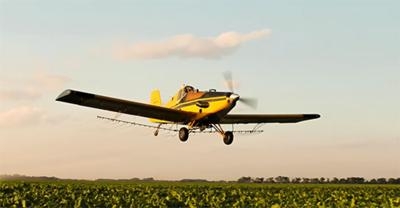Sun, Apr 13, 2025
Recommends Measures To Improve Safety For Aerial Applicators
In preparation for the upcoming agricultural growing season in the U.S., the National Agricultural Aviation Association (NAAA) is urging all operators of uncrewed aerial systems (UAS or drones) to be aware of low-altitude manned aircraft operations. The group has issued a set of recommendations for drone operators to do everything possible to avoid manned aircraft conducting low-altitude operations.

Every year, agricultural aviators apply seed, fertilizer, and crop protection measures to nearly 130 million acres of cropland in the U.S., in addition to millions of acres of pastureland, rangeland, and forests to assist farmers increase their productivity and protect their crops. Almost all of those operations involve low-altitude flight at speeds of up to 140 mph.
NAAA recommends drone operators follow these guidelines:
- Give the right of way to a manned aircraft: It’s the law.
- When you return to a field to fly a UAS, ensure that there are no manned aircraft working in the field. Fields should be scouted each time your pilot returns to the field, not only at the beginning of the application.
- Equip drones with visible strobe lights, highly visible markings and tracking technology, like an ADS-B In system.
- Monitor aviation radio frequency 122.925 MHz for crewed agricultural aircraft. To transmit, consider a radio station license by submitting FCC Form 605.
- Be certified and well-trained in operating an uncrewed aircraft.
- Contact local agricultural aviation operations before flying by consulting the Find An Aerial Applicator database at AgAviation.org.
- Land your uncrewed aircraft immediately when a low-flying aircraft is nearby.
- Carry uncrewed aircraft liability insurance.

Andrew Moore, chief executive officer of NAAA said, “With the increasing number of uncrewed aircraft operations over the last few years, their operators must be aware of low-flying, manned agricultural aircraft. It is extremely difficult, if not impossible, for manned aircraft to see a drone while conducting aerial applications 10 feet off the ground at speeds of up to 140 mph.
“UAS are not allowed above 400 feet without a waiver from the Federal Aviation Administration (FAA), meaning they share the low-altitude airspace with ag aircraft. We encourage professional and hobbyist UAS operators to keep this in mind, equip UAS with detect and avoid technology and give right-of-way to manned or crewed ag aircraft to ensure a safe 2025 growing season.”
More News
Pilot Also Reported That Due To A Fuel Leak, The Auxiliary Fuel Tanks Were Not Used On June 4, 2025, at 13:41 eastern daylight time, a Piper PA-23, N2109P, was substantially damage>[...]
Have A Story That NEEDS To Be Featured On Aero-News? Here’s How To Submit A Story To Our Team Some of the greatest new stories ANN has ever covered have been submitted by our>[...]
From 2023 (YouTube Edition): Reflections on War’s Collective Lessons and Cyclical Nature The exigencies of war ought be colorblind. Inane social-constructs the likes of racis>[...]
Aero Linx: Colorado Pilots Association (CPA) Colorado Pilots Association was incorporated as a Colorado Nonprofit Corporation in 1972. It is a statewide organization with over 700 >[...]
High Speed Taxiway A long radius taxiway designed and provided with lighting or marking to define the path of aircraft, traveling at high speed (up to 60 knots), from the runway ce>[...]
 NTSB Prelim: Piper PA-23
NTSB Prelim: Piper PA-23 ANN FAQ: Submit a News Story!
ANN FAQ: Submit a News Story! Classic Aero-TV: One Mans Vietnam
Classic Aero-TV: One Mans Vietnam ANN's Daily Aero-Linx (07.03.25)
ANN's Daily Aero-Linx (07.03.25) ANN's Daily Aero-Term (07.03.25): High Speed Taxiway
ANN's Daily Aero-Term (07.03.25): High Speed Taxiway



